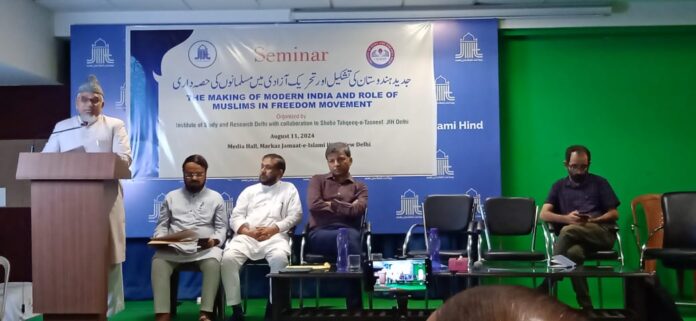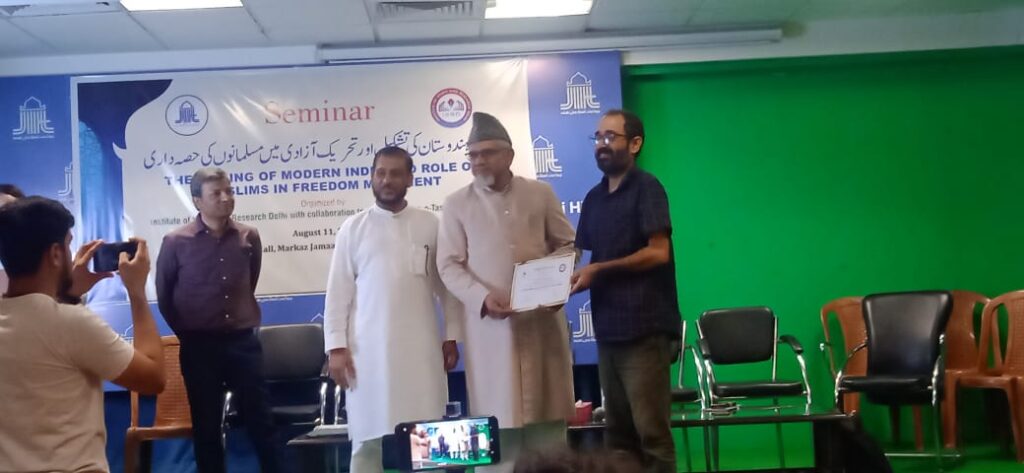
By Anwarulhaq Baig
NEW DELHI: Various speakers at a seminar here on Sunday said that the Muslim role in India’s independence and making of modern India was being overlooked by most of the historians.
The seminar titled “Making of Modern India and Role of Muslims in Freedom Movement” was part of a year-long campaign of the Jamaat-e-Islami Hind (JIH), Delhi unit, to create awareness about the role Muslims played in India’s struggle for freedom from Britishers.
In his inaugural speech, JIH Delhi state president Salimullah Khan emphasizing the importance of compiling and presenting historical facts from various sources across the country.
He expressed concern over the current trend of rewriting history by omitting the Muslim contribution to serve vested interests, which he believes, is creating misunderstandings and communal hatred in the country.
“We are making efforts to collect historical facts, heritage, and monument information that exists in Delhi and will present it to the people,” Salimullah Khan stated.
He quoted Ayash Khan, former director of the renowned Khuda Bakhsh Oriental Public Library in Patna, who highlighted the discrepancy between historical reality and its presentation by historians, often influenced by personal interests and inclinations.
The JIH state chief also cited renowned Islamic scholar Maulana Sadruddin Islahi, who emphasized the importance of genuine history writing and deplored the modification of historical narratives to suit personal agendas. He stressed that writing genuine history in the current climate is a significant service to humanity.
JIH Vice President Prof. Salim Engineer, in his presidential address, praised the seminar’s theme as timely and appropriate amid rising Islamophobia and propaganda against Muslims worldwide and rising hatred in the country. He urged scholars and academicians to counter these narratives by presenting the overlooked contributions of Muslims and Islam to the nation.
“This government is not just a government of a political party but an ideological one,” Prof. Salim stated.
“Their agenda includes creating hatred and division in society against Muslims and Islam.” Prof. Salim reiterated this point, highlighting the ongoing attempts by the ruling government to rewrite history in a biased manner.
He emphasized that history should serve as a lesson for the future, advocating for collective action across communities to promote unity, reminiscent of the collaborative spirit against British colonialism. He emphasized the need for more conferences and seminars throughout the country to counter rising propaganda and hatred against Muslims.
The JIH Vice President asserted that Muslim participation in the freedom struggle was inspired by Islamic teachings, which fundamentally oppose injustice and oppression. He criticized both the British colonial distortion of history and current efforts by the ruling dispensation to rewrite history with bias against Muslims and Islam. Calling for more such events throughout the country, he emphasized the need for rigorous research, documentation, and public education to ensure historical accuracy in shaping national discourse and identity.
Unsung Heroes of the Freedom Struggle
Syed Ubaidur Rahman, a prominent who has authored several books on the history of Muslims in India, provided a comprehensive account of Muslim contributions to the freedom struggle. He highlighted the Faraizi Movement of 1819 as the first freedom movement, predating the widely acknowledged 1857 uprising.
“The Faraizi Movement, launched by Haji Shariatullah in 1819, was not just a religious reform movement but a revolt against oppressive landlords patronized by British colonizers,” Syed Ubaid explained. He emphasized that this movement, which lasted for 50 to 60 years, offered significant sacrifices and impact.
Syed Ubaid also shed light on the role of the last Mughal emperor, Bahadur Shah Zafar, in the 1857 revolt. “Zafar had nothing to lose, as Mughal rule had already deteriorated to the lowest level before he took charge,” he clarified. “But for the sake of freedom, he revolted against the British Raj, leaving his luxurious life and power behind,” he pointed out.
The writer listed numerous prominent freedom fighters who made great sacrifices, including Imam Bakhsh Sahbai, Mufti Sadruddin Azurda, Maulana Azad Subhani, and Maulvi Abdullah Shah.
Syed Ubaidur Rahman drew attention to many unsung heroes, including Maulvi Abdullah Shah and Azeemullah Khan, who played pivotal roles in the freedom movement. He enumerated the sacrifices of various freedom fighters, such as Imam Bakhsh Sahbai, Maulana Jafar Thaneswi, and Maulvi Liaquat Ali, all of whom displayed unwavering commitment to India’s independence, often at the cost of their lives and liberty.
Syed Ubaid also highlighted the pivotal role of the Reshmi Rumal Movement, led by the esteemed Deobandi scholar Shaikhul Hind Maulana Mahmoodul Hasan. This revolutionary movement, noted by the British Rowlatt Committee as a significant threat to British rule, garnered substantial support from the Ottoman Empire, Germany, Russia, and Afghanistan in its quest to destabilize British India. Maulana Hasan even travelled to Mecca seeking military assistance against the British government. However, the outbreak of World War I led to the unravelling of their plans, resulting in the imprisonment of many Indian revolutionaries, including Maulana Hasan, who was later released from Malta jail due to ill health.
Ubaid also remembered key figures like Haji Sahib of Turangzai, who bravely fought against British forces during the 1897 Frontier Revolt, and Maulana Barkatullah Bhopali, who served as the Prime Minister of India’s first Provisional Government in Afghanistan in 1915. He further shed light on Mohammad Iqbal Shedai, who established the Azad Hind Government in exile in Rome in 1941, and the tragic fate of Imam Bakhsh Sehbai, a scholar and poet executed by the British after the 1857 uprising, alongside his family members.
Syed Ubaid stressed the need to document and raise awareness about these unsung heroes of the freedom struggle, many of whom remain unknown to the general public.
Highlighting Women’s Contributions
Mrs. Syedah Swaleha Jabeen, a freelance journalist, focused on the contributions of Muslim women to India’s freedom struggle. She asserted that while their role was strong and leading, it has not been adequately documented. “Thousands of Indian Muslim women joined the freedom war, sacrificing their lives or facing acute suffering,”Swaleha Jabeen stated. She mentioned prominent figures such as Begum Hazrat Mahal, Abidi Bano Begum, and Aruna Asif Ali, among others. Jabeen recounted how Begum Hazrat Mahal, dressed as a soldier, led a group of fighters during the 1857 uprising, demonstrating the active involvement of women in the struggle for independence.
Swaleha Jabeen highlighted the significant contributions of Abadi Bano Begum, affectionately known as Bi Amma, during the Indian freedom struggle. As the mother of prominent freedom fighters Maulana Mohammad Ali Johar and Maulana Shaukat Ali, Bi Amma played an active role in the movement for independence. Her sons became key figures in both the Khilafat Movement and the broader Indian independence movement, significantly impacting the non-cooperation movement against British rule. Notably, they were also founders of the esteemed Jamia Millia Islamia, furthering their commitment to education and social reform.
She quoted Mahatma Gandhi, who wrote in Young India newspaper that “without mentioning the contributions of Muslim women, the history of the Indian freedom movement is absolutely incomplete.”
Political Leadership and Community Contributions
Dr. Abdullah Chishti, Assistant Professor at Jamia Millia Islamia, discussed Muslim political leadership in shaping the discourse of India’s freedom movement. He emphasized the need to focus on the role of the masses across all communities, rather than just leaders or religious groups.
“We talk much about the leaders and religious groups but less discuss the role of masses cutting across casts, sects, race, and religious divides,” Chishti noted. He pointed out that figures like Bhagat Singh and Subhash Chandra Bose had a significant following among Muslim masses.
Chishti also addressed the issue of communal periodization of Indian history, tracing it back to British scholar James Mill’s division of Indian history into Hindu and Muslim periods in 1817. He argued that this division paved the way for the two-nation theory during the British colonial period.
However, Chishti emphasized that not all Muslims favoured a separate homeland. He cited examples of prominent figures like Maulana Abul Kalam Azad, Khan Abdul Ghaffar Khan, and Allama Mashriqi, who were strong opponents of partition.
Dr. Abhay Kumar, a former History Scholar from JNU, spoke about the enduring impact of Muslim heritage on modern India’s cultural fabric. He stressed the importance of understanding and communicating history to counter ongoing efforts to distort it.

Prof. Salim Engineer presenting a memento to former JNU scholar Dr. Abhay Kumar.
“If you want to save India, you have to first understand the history of the country and then tell it to the common people in popular language,” Kumar asserted. He criticized the common approach of memorizing history in chronological order without understanding the ‘why’ and ‘how’ behind historical events. He emphasized the importance of understanding the ‘why’ and ‘how’ behind historical events, rather than merely memorizing dates and facts.
Kumar traced the roots of historical distortion back to the colonial period, criticizing early European writers for their biased portrayals of Indian history. He pointed out that many colonial historians, such as James Mill, wrote about India without ever visiting the country.
“To understand the distortion of history, we have to trace it back to the colonial period,” Kumar explained. “When the British came to India, they started writing history as a systematic institution, even colonial historians who wrote Indian history often never visited India.”
Kumar also addressed the visible bias and prejudice against Muslims in the writings of European scholars like Max Muller. He argued that these prejudices were partly because Muslim rulers were in power when the British arrived in India, and Muslims were among the first to resist foreign rule.
He also addressed the need for genuine history writing, urging efforts to preserve public-level history rather than relying solely on government or agency accounts.
JIH Delhi state secretary and organizer of the seminar Asif Iqbal provided an overview of the event’s objectives. He explained that the seminar aimed to highlight the contributions of Muslims in the freedom struggle and the reconstruction of the country, facts that a vast majority of the country is not well aware of or has overlooked.
Asif Iqbal announced that this seminar is a precursor to an upcoming grand history conference to be held in February next year in Delhi. He also revealed plans for about 10 similar history conferences to be held across different major cities in India, covering various themes including architecture, art and culture, spirituality, social reforms, textiles and craftsmanship, environmental contributions, cultural syncretic festivals, struggle heritage, mass movements, and Muslim personalities and their contributions.




